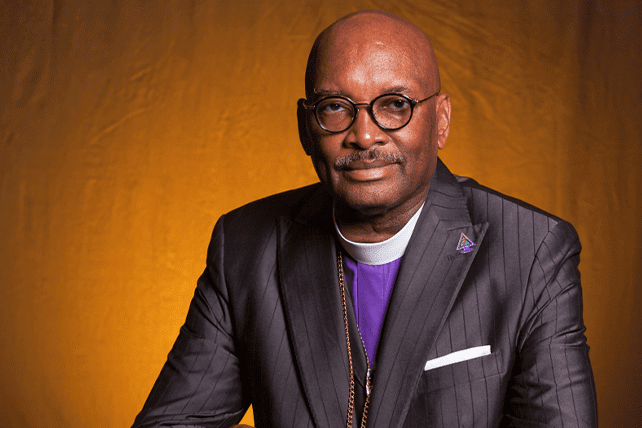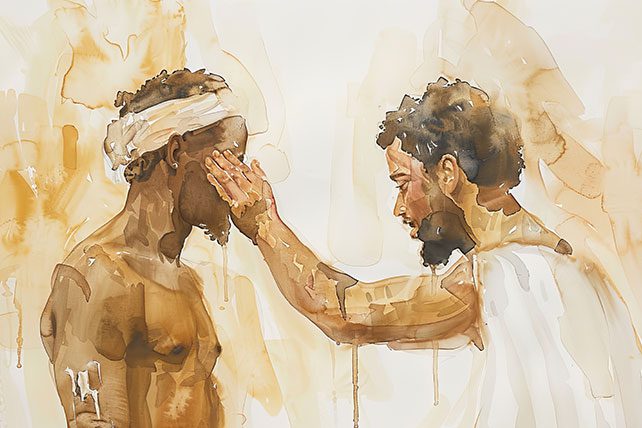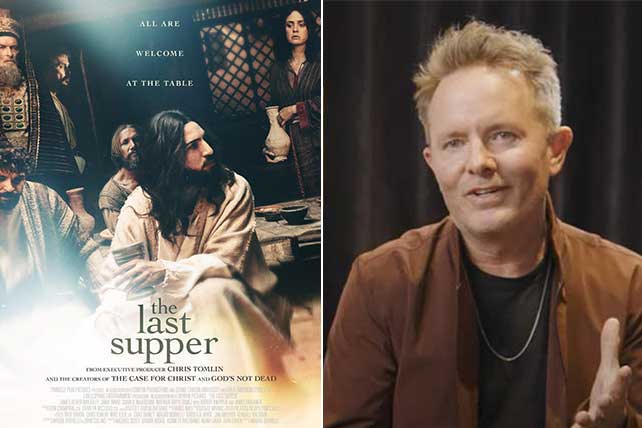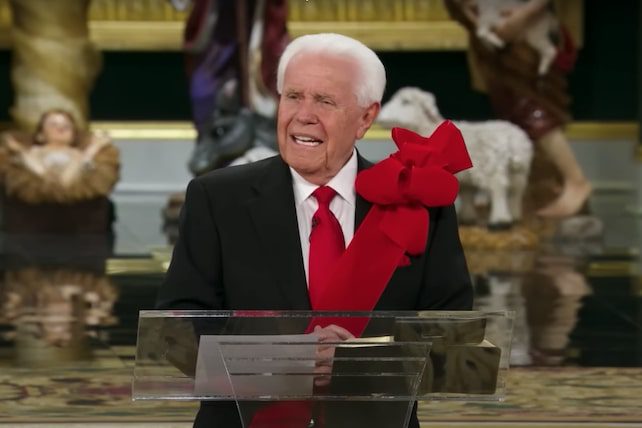BROWNSVILLE, Texas (RNS) — Back in December, a group of migrants, released just hours before from detention centers or Customs and Border Protection processing, sat beside a large photo of Nazareth in the sanctuary of Iglesia Bautista West Brownsville, ready to participate in Wednesday night worship.
After a dinner of spaghetti, pizza and Coca-Cola prepared by women from this Southern Baptist church, the Rev. Carlos Navarro hoped they could turn their attention to Jesus. The group of 15 migrants joined about 40 regular congregants for a Bible study and worship service in a sanctuary decked out with Christmas decorations, images of Israel and declarations in Spanish that “Jesus Christ is the Lord of the Church.”
In a sermon on Psalm 140, a prayer for protection from the evildoers, Navarro told the newly arrived migrants and his congregants to rely on God for protection against evil people surrounding them, whether bosses or family members. “When God wants to protect me because he knows that there is something that could happen, he takes away that person that I am sure had something planned against me. Deliver us Lord from all evil,” he preached in Spanish before encouraging the migrants to accept Jesus in a silent prayer.
Where the “government sees a threat, a problem, society sees a danger with people that they don’t know, we see an opportunity to share the Gospel,” Navarro, a 64-year-old Guatemalan immigrant who came to the U.S. in 1982 and a decade later became pastor of the West Brownsville church, told RNS in English in December.
In 2017, Navarro began Ministerio Golán, a ministry of Iglesia Bautista West Brownsville named after the biblical Golan Heights — a nod to the congregation’s devotion to Israel. Since then, the church has worked with government authorities, who would tell Navarro when they were releasing migrants from their custody. The church would briefly host them for food, supplies and evangelization before dropping them off to sleep at the airport, on their way to their final destinations in the U.S.
But now, with President Donald Trump having shut down the Biden-era app that allowed migrants to make appointments to seek asylum and curtailed other asylum opportunities, the Baptist church is only serving the slow trickle of unaccompanied minors released from the custody of the Department of Health and Human Services after their 18th birthday, as well as six migrant families who have chosen to stay in Brownsville, hearing there won’t be work in other U.S. cities.
“The word ‘migrants’ will be forgotten soon,” said Navarro in a March 5 phone call with RNS, describing the recent shuttering of migrant services along the border.
Volunteers from the Spanish-speaking church, which has about 300 congregants attending Sunday services, has historically served dinner to migrants all throughout the week. They also have a street evangelization ministry and ministries to people experiencing homelessness and those in nursing homes. Behind the church, with offices and worship space for the congregation of first- and second-generation Latinos, sits a one-story building with space to house up to 18 migrants who experience problems in reaching their final destination.
On that December night, Lindsey, a Guatemalan migrant just released who said she was going to meet an aunt she had not seen since she was 2 years old, told RNS that without Ministerio Golán, she would have spent the night at the airport crying by herself. (RNS is only using migrants’ first names to protect their safety should they return to their countries of origin.)
Instead, she stood beside Carla, a fellow Guatemalan migrant, as both agreed that their time at Iglesia Bautista West Brownsville had been “a blessing,” reinforcing that “God is good.”
The migrants at West Brownsville Baptist church told RNS they were fleeing political instability, police corruption, economic turmoil and domestic violence. One woman said she was fleeing a partner who had imprisoned her and beaten her, even while pregnant.
“The safety, it changes everything,” Oswal, a Venezuelan migrant among the small group of migrants staying in longer-term housing on Iglesia Bautista West Brownsville’s campus.
Like other migrants in Ministerio Golán, Oswal said he was determined to do things the legal way — by using the CBP One app — and that he hoped to find work quickly. He told RNS he had decided to leave Venezuela after his small business was repeatedly extorted by police, but his journey to the U.S. had presented new dangers.
Oswal, as well as Daniela and Verónica, two other Venezuelans who had stayed in Casa Golán’s housing, recounted their harrowing trips through the Darien Gap, a jungle route between Colombia to Panama. They described being on high alert for criminal groups who assault and rob migrants. Daniela said her journey to the U.S. took over a year due to sickness and lack of funds. Verónica recalled almost drowning during a river crossing, and the other two said they had seen or heard of other migrants who had.
For Verónica, it was her first time becoming close to a church. “It’s different to what I thought,” Verónica, whom Navarro enlisted as his assistant while her husband began working after their arrival last spring, told RNS. “I always thought other ugly things about the church, about people from the church, because of what you see in the news.”
Saying she jumps in to help wherever needed, Verónica cooked dinner for Casa Golán while speaking with RNS and then became a photographer when the group of new migrants arrived hours later. Oswal and Daniela also said they looked for any opportunity to give back to the church that had supported them.
Tracking the stats under the title “Hosting Angels” on their Facebook page, Navarro told RNS in March that the church had, since 2019, assisted more than 91,000 migrants materially and seen more than 26,000 make “decisions for Christ” — by praying to accept Jesus Christ as their Lord and savior. Another 3,461 migrants have stayed overnight in the church’s respite center, and the ministry has given out over 25,000 Bibles.





























